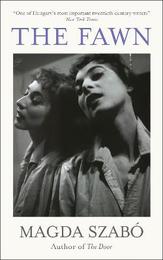
|
The Fawn
Paperback / softback
Main Details
| Title |
The Fawn
|
| Authors and Contributors |
By (author) Magda Szabo
|
|
Translated by Len Rix
|
| Physical Properties |
| Format:Paperback / softback | | Pages:288 | | Dimensions(mm): Height 214,Width 134 |
|
| Category/Genre | Modern and contemporary fiction (post c 1945)
First world war |
|---|
| ISBN/Barcode |
9781529425642
|
| Classifications | Dewey:894.511334 |
|---|
| Audience | |
|---|
|
Publishing Details |
| Publisher |
Quercus Publishing
|
| Imprint |
MacLehose Press
|
| NZ Release Date |
30 May 2023 |
| Publication Country |
United Kingdom
|
Description
"One of Hungary's most important twentieth-century writers" New York Times "Magda Szabo's fiction shows the travails of modern Hungarian history from oblique but sharply illuminating angles" Economist Eszter Encsy is an acclaimed actress, funny and outrageous, quick-witted but callous. Yet even flushed with the success of adulthood, Eszter craves acceptance of herself as she really is and of the person she has been. The only child of an impoverished aristocrat and a harried music teacher failing to make ends meet, Eszter grew up poor and painfully aware of it in a provincial Hungarian town. The feelings of resentment and envy acquired during her fraught childhood have hardened into an obsessional hatred for one person, the beautiful, saintly and pampered Angela, Eszter's former classmate and the wife of the man who becomes her lover. Set against newly communist 1950s Hungary, The Fawn embraces the lies and falsehoods people were obliged to live with in those nightmarish times, and displays Szabo's uncanny ability to convey how the past can haunt and consume us. Translated from the Hungarian by Len Rix.
Author Biography
Magda Szabo was born in Debrecen, eastern Hungary, in 1917, and began her working life as a teacher. From 1949 onwards her work was banned, but she burst onto the literary scene in 1958 with the publication of Fresco and The Dawn. The Fawn was first published in 1959, Katalin Street in 1969 and Abigail in 1970. In 1987, publication of The Door brought her international recognition and was the winner of the Prix Femina and the Mondello Prize. She died in 2007. In 2016 The Door was chosen as Best Book of the Year by the New York Times.
ReviewsSzabo's prose is a powerful reminder of just how resonant the relationship between language and memory can be * World Literature Today * Magda Szabo's fiction shows the travails of modern Hungarian history from oblique but sharply illuminating angles * Economist * One of Hungary's most important twentieth-century writers * New York Times * Magda Szabo's work casts an indirect light upon the dimness that exists between our public and private selves, a place wherein our betrayals-both personal and political-flicker uneasily over the walls * LitHub *
|